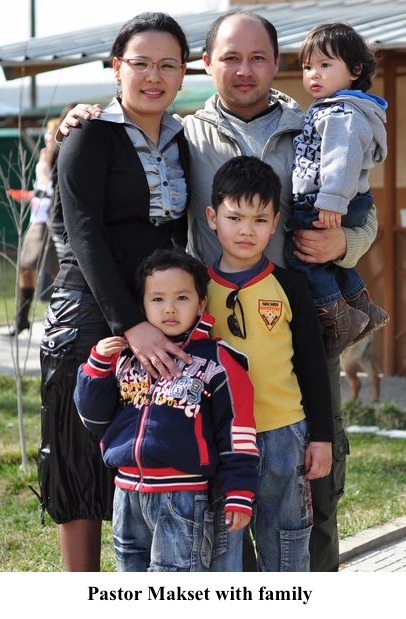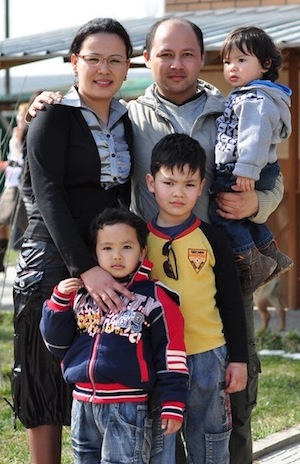Kazakhstan is at a Critical Point of Decision
 Tuesday, November 20, 2012 at 08:20PM
Tuesday, November 20, 2012 at 08:20PM By Kevin White
 Kazakhstan is a nation with great promise and potential. While Kazakhstan enjoys a wealth of natural resources, we must also realize that in order to truly be successful, we also need the moral and spiritual foundation upon which success and prosperity can be achieved. History has repeatedly demonstrated that the Christian faith produces a citizenry which is honest, law-abiding, hardworking and productive. In Almaty in 2003, South Korean businessmen and diplomats brilliantly argued in defense of Christianity at the Protestant Forum, sponsored by the Turkish Institute. They explained that as people in South Korean turned to Christianity, this produced an atmosphere which led to the huge growth in the South Korean economy.
Kazakhstan is a nation with great promise and potential. While Kazakhstan enjoys a wealth of natural resources, we must also realize that in order to truly be successful, we also need the moral and spiritual foundation upon which success and prosperity can be achieved. History has repeatedly demonstrated that the Christian faith produces a citizenry which is honest, law-abiding, hardworking and productive. In Almaty in 2003, South Korean businessmen and diplomats brilliantly argued in defense of Christianity at the Protestant Forum, sponsored by the Turkish Institute. They explained that as people in South Korean turned to Christianity, this produced an atmosphere which led to the huge growth in the South Korean economy.
Kazakhstan is currently center stage for a growing international issue which will set precedence and have larger implications on Kazakhstan’s posture toward personal freedom and democracy. Makset Djabbarbergenov is an Uzbek Christian pastor wanted in his home country for "illegal" religious teaching and literature distribution. He has been arrested by Kazakhstan authorities who are currently considering his deportation back to Uzbekistan, in violation of international law. Djabbarbergenov has been given refugee status by the United Nations since 2007.
He is married with four boys, one of whom was born since the family's arrival in Kazakhstan. He and his wife are expecting their fifth child next spring.
Daniyar Zharykbasov of the prosecutor’s office told western news agency Forum 18 that the Uzbek authorities put Djabbarbergenov on a wanted list for the Commonwealth of Independent States on 29 February 2012 for a "crime" he committed in 2007. He stated that the Uzbek authorities are seeking to
imprison Djabbarbergenov because he led an unregistered Protestant church
in his home town of Nukus in Karakalpakstan. Zharykbasov then expressed
some sympathy for him. "As a person I can say this is not right…but we have to follow the rules.”
At the recent Religious Freedom and National Security Policy conference at Georgetown University, former National Security Council representative Will Imboden described how any erosion in a country's religious freedom invariably signals the erosion of all other liberties and human rights. Governments that are not committed to religious liberty become increasingly intolerant and coercive, insisting that they have a monopoly on truth that must be forced on others. Without religious freedom, democracy suffers, economic stagnation becomes inevitable.
In spite of Kazakhstan’s steps towards democracy and free market reforms, there remains still a Soviet-era mentality and mistrust towards the Christian faith. Consequently the government fails to realize the importance and profound benefits which the Christian faith has to offer society.
The American founding founders understood this in their framing of the constitution and the importance of religion. Thomas Jefferson wrote that “religion and morality are the safeguards of democracy.” Jefferson understood that religion and morality, fostered by religious conviction are the foundation for freedom and democracy.
The philosophical ideas of the Christian faith has permeated Western culture, and produced such a relatively just and civil society, where human rights and property are respected and protected. This influence has produced the moral climate which fostered conditions for the West to become the most prosperous economies in the world.
Freedom and human rights, as expressed through the freedom of religion, speech, press, assembly, and vote are what produce the vital sense of ownership of the nation by the people. This sense of ownership is what fosters the sense of social and civic responsibility, which motivates private citizens to make a great nation. It is this atmosphere of democracy in which business and free markets thrive.
In contrast to the West, Lenin built the Soviet Union upon an atheistic Marxism which was diametrically opposed to and viciously incompatible with Christianity. Lenin wrote: “There is nothing more abominable than religion,” and that under communism: “God does not exist, cannot exist, and must not exist.” Because of this predisposition against the Christian faith, the Soviet Union was deprived of the benefit of moral guidance and instruction provided by the Bible through the institution of the church.
Soviet dissident Alexander Solzhenitsyn wrote that the communists were determined to destroy Christianity. Atheism was not just the underlying worldview of Soviet socialism; atheism was the purpose of socialism. Solzhenitsyn wrote that the communists “flee from Christ like devils from the sign of the cross.”
Indeed ideas have consequences. Fyodor Dostoyevsky prophetically wrote: “if there is no God, then everything is permissible. Crime will be inevitable.” Atheism removed the basis of personal responsibility and accountability for behavior before God as well as society. Atheism removed any higher moral authority than one’s own. The natural consequence is the mentality of “every man for himself” and “survival of the fittest”, rather than by principle and rule of law. This can account for the lawlessness throughout the CIS, where mafia and corruption is so rampant. Georgian gangster and godfather of the Russian mafia Otari Kvantrishvili stated: “It was Vladimir Lenin who was the real organizer of the mafia and set up the criminal state.”
Dostoyevsky understood that if there is no God, then ultimately there can be no basis for morality and law, or for human rights. If there is no God, then we are just animals engaged in the Darwinist struggle: “survival of the fittest.” In such case, people’s rights and property do not matter. If there is no God, then there is no higher governing principle, upon which to base justice. Law is then simply determined by power, money, or influence. This can only result in lawlessness, corruption, and injustice; which will ultimately lead to discontent, unrest, apathy, and economic stagnation.
History has demonstrated that Christianity has served to greatly develop civilization and culture. Charles Colson in his book How Now Shall We Live?, describes how the conversions of the barbarians to Christianity led to economic prosperity which Europe now enjoys. “As the barbarians were converted and the destructive invasions ceased, European society began to flourish. Cities grew, guilds emerged to protect the interests of the crafts and professions, and ideas of representative government took root. In this setting, Christianity gave birth to a new institution, the university, which developed from schools attached to the great cathedrals in places such as Paris and Bologna, eventually replacing the monasteries as centers of learning and culture.” It is also noteworthy, that seventeen of the first eighteen universities in America, including Harvard and Yale, were founded by the church. Indeed these are the economic benefits of Christianity.
In his speech to receive the Templeton Prize for Religion, Charles Colson stated that the Judeo-Christian heritage of America laid the foundation of freedom in the West. “It established a standard of justice over both men and nations. It has proclaimed a higher law that exposes the pretensions of tyrants. It has taught that every human soul is on a path of immortality, that every man and woman is to be treated as the child of a King.”
Colson continues, “This muscular faith has motivated excellence in art and discovery in science. It has under girded an ethic of work and an ethic of service. It has tempered freedom with internal restraint, so our laws could be permissive while our society was not. Christian conviction inspires public virtue, the moral impulse to do good. It has sent legions into battle against disease, oppression, and bigotry. It ended the slave trade, built hospitals and orphanages, and tamed the brutality of mental wards and prisons.”
In his book Victory of Reason, Rodney Stark quotes a recent statement from one of China’s leading scholars, “in the past twenty years, we have realized that the heart of your culture is your religion: Christianity. That is why the West is so powerful. The Christian moral foundation of social and cultural life was what made possible the emergence of capitalism and then the successful transition to democratic politics.” Stark also describes how that these ideas are directly responsible for the development of free markets, science, technology, and industry.
Makset Djabbarbergenov is not a threat, but rather a hero. He is God’s messenger bringing the word of God to our society. We should not deport him, but embrace him and let him do his work, as well as the other pastors who are faithfully serving our nation. For it is the message they bring which will heal the soul of our nation. The Uzbek government does not appreciate this pastor because they do not appreciate the message he brings. We are not Uzbekistan. We are Kazakhstan, a nation of hospitality where all are welcome.
The answer for Kazakhstan, as well as any society, is not in revolution of war, but rather in the moral revolution of the human heart. It is found in spiritual and moral revival found in Jesus Christ. As individuals and nations are reconciled to God, people’s lives are changed and they become God’s moral agents to bring light and hope to a world of spiritual darkness and death. There are tangible economic benefits for those who heed the counsel of the manual given by the Designer.
Today is the call for a new beginning for Kazakhstan. In II Chronicles 7:14, God promises: “If my people, which are called by my name, shall humble themselves, and pray, and seek my face, and turn from their wicked ways; then will I hear from heaven, and will forgive their sin, and will heal their land.” It is the desire of God, not only to hear our prayers and forgive our sins, but it is also His desire to heal and to bless the nation of Kazakhstan. We must listen to the moral and spiritual guidance and instruction of His word. We must allow the churches to thrive and serve as the instrument for moral guidance for our society.
It is time to forever shed the lies of Soviet-era atheism and to embrace the Christ, the savior of all peoples. Atheism and the persecution of Christianity will ultimately forfeit economic prosperity. Such prosperity can only occur in a climate of freedom, human rights, and rule of law. These virtues are fostered by the principles of Biblical Christianity permeating society. Indeed the ancient scripture, validated throughout the history of human experience, calls and invites Kazakhstan to return to God and His path: “Blessed is the nation, whose God is the Lord.”



